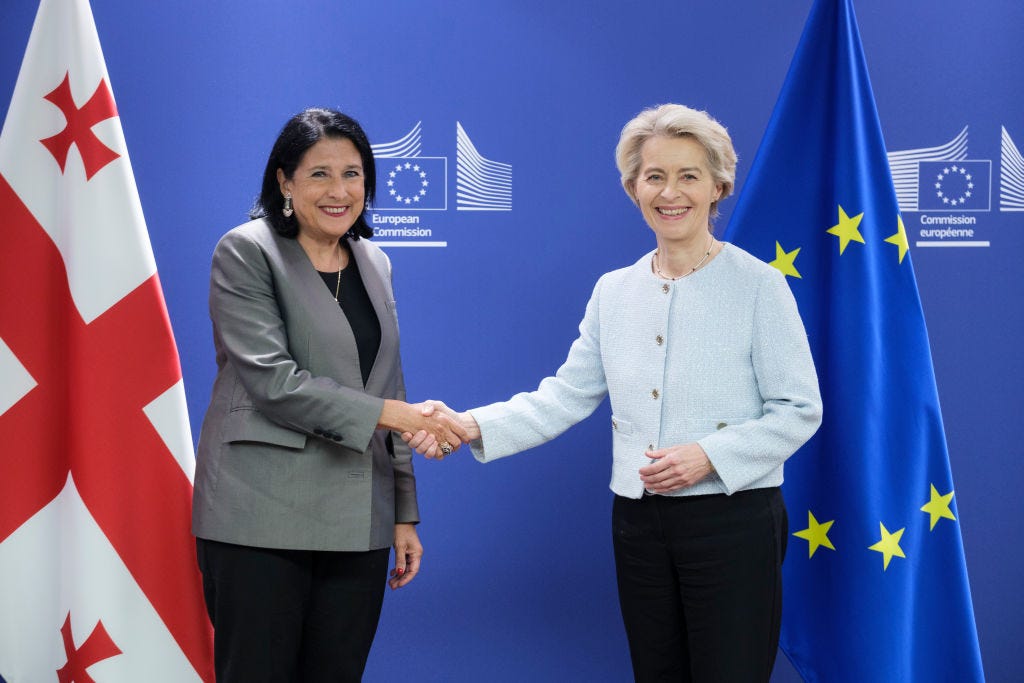Gas Gobbler
How Turkey is maneuvering to profit from Europe’s energy follies.
“There is no friendship in trade.” – Cornelius Vanderbilt
On October 26, a bitterly contested election was held in the former Soviet republic of Georgia. Widely seen as a referendum on its citizens’ aspirations to join the European Union (EU) or to instead continue the recent pivot towards the Russian sphere of influence, the outcome has provoked significant controversy. According to the official results, the incumbent pro-Russia party, Georgia Dream, won nearly 54% of the vote, enough for a clear majority in parliament. Leaders of the EU are crying foul, claiming the vote was rigged and the process replete with interference from Moscow.
Leading the opposition in protest of the results is Georgian President Salome Zourabichvili. In a happy coincidence, Zourabichvili was born in France and served in the French diplomatic service for multiple decades before becoming a Georgian citizen in 2004. Although her role is meant to be largely ceremonial (the real power is held by the prime minister, elected by parliament), she recently filed a lawsuit in the country’s constitutional court to invalidate the election results. For its part, Moscow is accusing the West of attempting to provoke another so-called “color revolution” in Georgia, laying bare the raw political brawl currently unfolding.
A benign interpretation of these events is that Europe’s leaders are genuinely interested in preserving democratic ideals, fighting authoritarianism, and all that jazz. To the more cynically minded, the West views Georgia as just another pawn in a grand geopolitical chess game and is feigning concern over the citizens who live there. In our worldview, wherever there is tension between the great powers, there is almost always an energy artery nearby that might explain the inflamation. The current scuffle in Georgia is no different. For a helpful clue, we need to look no further than the ongoing United Nations Climate Change Conference (COP29) in neighboring Azerbaijan, where an otherwise obscure deal announced in the early days of the gathering caught our attention:
“Italgas and SOCAR (State Oil Company of the Azerbaijan Republic) signed a Cooperation Agreement today at COP29, renewing and strengthening the collaboration between the two industrial groups. The agreement, signed by Paolo Gallo, CEO of Italgas, and Elshad Nassirov, SOCAR Vice President responsible for gas, consolidates a strategic partnership aimed at promoting innovation, efficiency, and sustainability in the gas distribution sector.
Key areas of collaboration include the exchange of best practices and technologies to accelerate the energy transition and digitalization, with a particular emphasis on decarbonizing infrastructure through gas leak detection using Picarro technology, as well as process digitalization through the agile methodology, which has been in place at Italgas’s digital factory—the group’s hub for digital transformation—since 2018.”
As natural gas journeys from Azerbaijan to Italy, it not only passes through Turkey but must first transit through Georgia itself. The South Caucasus Pipeline (SCP)—built to circumnavigate Azerbaijan’s arch enemy, Armenia—is thus a potential choke point in the broader regional energy wars. It also makes Georgia a necessary partner to Turkey as it seeks to take full advantage of the natural gas crisis in Europe, moves that have been supported by Moscow but opposed in Brussels.
Since the days of the Ottoman Empire, the territory of modern-day Turkey has been ideally situated to influence trade routes for economic gain. As a land bridge connecting Europe, Asia, the Middle East, and Africa, and with long coasts that border the Black Sea and the Mediterranean Sea, Turkey can exercise outsized influence over the global transit of all manner of goods. Turkish President Recep Tayyip Erdoğan has prioritized making his country the preeminent natural gas hub for all of Europe, an ambition made far more plausible by the outbreak of war in Ukraine and the EU’s haphazard response to it.
Viewed through this lens, the skirmish in Georgia takes on a new dimension, and if Erdoğan prevails in his overarching mission, Turkey will parlay its geographic advantages into both energy abundance for itself and outsized influence over the economic development of the Old Continent. It could also further shift economic might in Europe from west to east, from those that are foolish enough to think heavy industry can be powered by wind and solar alone to countries that are happy to receive cheap natural gas, regardless of who is doing the selling. Let’s catalog what Erdoğan has been up to, assess his prospects for success, and ponder the response from Brussels.



